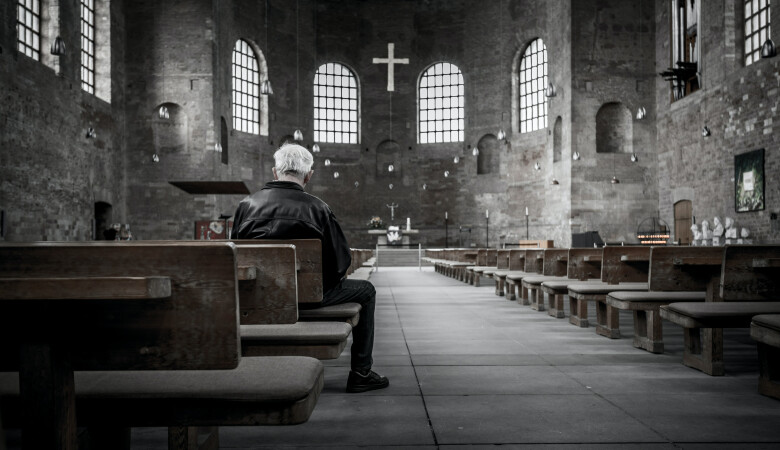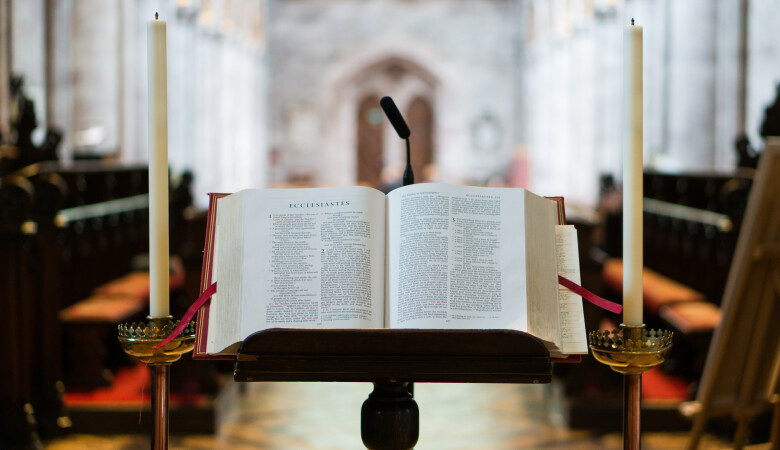The God of All Comfort
February 02, 2003 | Andy Davis
2 Corinthians 1:1-24
Joy in Suffering, Omniscience of God
Pastor Andy Davis preached on 2 Corinthians 1:3-11 to explain why God is the ultimate source of comfort for Christians facing suffering.
- SERMON TRANSCRIPT -
The Source of Comfort: God (1:3)
Please, if you would turn in your Scriptures to 2 Corinthians chapter 1. It is my intention to resume our series in Matthew next week, but our church family sustained a tragic and shocking loss this week in the death of Jim Holland, and it seemed right, and I was, I think, led by the Spirit to focus on God as the God of all comfort. You may not have known Jim, but he stood here at the door and gave bulletins every week, and did many other things besides. And many of you, all of us, I think, to a great or less degree, will miss him.
Also, you know that there was a tragedy yesterday in our nation and our president came on the television and I was so pleased as he drew our attention to a magnificent piece of Scripture, Isaiah chapter 40, in which he said, "Lift up your eyes and look to the heavens: Who created all these things? He who created the starry host and brings them out one by one, and calls them each by name. Because of his great power and his mighty strength, not one of them is missing."
Isn't that a magnificent passage of Scripture? And I'm so grateful for our President, and we need to be faithful and praying for him as he faces some incredible challenges and needs wisdom from God, and we should be praying for him because we're commanded to do so. But I'm grateful for a President that will bring our attention to Isaiah 40. And you know at the very beginning of that chapter, one of the most magnificent chapters in all the Bible, God gives a command to his prophet Isaiah, a double command in which he says, "Comfort, comfort my people says your God, speak tenderly to Jerusalem and proclaim to her that her hard service has been completed, that her sin has been paid for, that she has received from the Lord's hand double for all her sins." A command from the eternal God to his prophet that he speak a word of God, a word of comfort to his people.
And so I felt in the same way that God wanted me to minister a word of comfort to you today. And so we'll be looking at 2 Corinthians chapter 1, and immediately we're going to see our attention focused on God himself. He is the God of all comfort. Look at verse 3. It says, "Praise be to the God and Father of our Lord Jesus Christ, the Father of mercies, and the God of all comfort." You know, actually praising God in the midst of suffering is strange for our flesh, is it not? It runs contrary to our nature. Apart from God, we would never praise God in the midst of suffering, in the midst of trials.
Praise While Suffering a Strange Reaction for the Flesh
In the midst of trials, we have a tendency to murmur and complain, to upbraid, to chafe and strive, perhaps even to question God, maybe even the extreme to shake our fist at God. And we've seen that again and again. This is our natural tendency. We do not naturally praise God in the midst of suffering. But if we are regenerate, if we are born again by the Holy Spirit, we have been instructed and we are led to praise God always. And especially so, we are trained to praise him in adverse circumstances, to praise him when we're suffering. When we need him the most.
Truly Regenerate People Have Learned to Look Upward and Praise God No Matter What the Circumstances
Job, in Job chapter 1, after he was assaulted by a series of trials that probably no one in this room will ever have to undergo, the kind of day that would knock flat anybody who did not have a solid foundation, on a rock that does not move. Job, it says, "got up and tore his robe and shaved his head, and then he fell to the ground in worship", in worship. And he said, "Naked I came from my mother's womb and naked I will depart. The Lord gave and the Lord has taken away. May the name of the Lord be praised." That is the response of a regenerate person to suffering: praise the Lord. May the name of the Lord be praised.
And then Paul and Silas, when they were arrested for preaching the Gospel in Philippi. And when they were scourged and beaten and exposed to public disgrace in shame and then thrown into prison, a miserable, dark place. And they were shackled by the jailer there who soon would come to faith in Christ, though he did not know it. What did they do? At midnight in the, I think, pitch blackness and darkness, because the jailer had to call for torches when he went in there, in the pitch blackness, they are praising God and they are singing hymns to his name. So I say to you that it is not our nature to praise God in adverse circumstances, but it is part of our new nature, having been born again, regenerate through faith in Christ, to praise him always, because he is the God and Father of our Lord Jesus Christ.
Paul Focuses Totally on God for Comfort
So, Paul here in 2 Corinthians, even in the midst, I believe, of great suffering still—he's still going through trial. He begins this letter with a word of praise to God. Praise be to God, he says, right from the start. Paul's heart is warmed and he is moved to praise the eternal God, and from the internal heart flows out words of praise and honor to God.
Richard Sibbes, a Puritan theologian who wrote 300 pages on the first chapter of 2 Corinthians 1. 2 Corinthians 1, 300 pages. I only got through about 70 of it. I wish I could have read the whole thing, but I ran out of time. But he ministered comfort to me, and he was thinking and meditating on all of this and thinking about our new nature in Christ. And this is what he says, "It is the disposition of God's children after they have tasted the sweet mercy and comfort and love of God, to break forth into the praising of God and to thanksgiving."
He said, "It is as natural for the new creature to do so, as for the birds to sing in the spring. When the sun has warmed the poor creature, it shows forth its thankfulness by singing." And he said, "It can no more be kept from it than fire kept from burning or water from cooling." We must praise our Lord. And so while it runs contrary to our flesh, to our nature, naturally, to praise God at all, but certainly not in adverse circumstances, it is right down the center of our new nature to praise him always, and especially when we are suffering and struggling. The only unshakable source of comfort in this world is God himself.
"The only unshakable source of comfort in this world is God himself."
God and Father of Christ
And so I begin this message today by concentrating your thoughts and your focus on the unchangeable God. We seek many sources of comfort, don't we? Some of them are solid and worth our trust, and some of them are not. Some of them are shaky, and some of them downright misleading. We can trust in circumstances that never really come about, we can trust in people who let us down, but God is the unshakable rock. And he is the unshakable source of comfort. And to God and to God alone, must we look for this comfort. But first and foremost, we must look to him as he is the God and Father of our Lord Jesus Christ.
We must look to him in his triune nature—Father, Son, and Spirit. We are praising God. We are worshipping him. We're giving him words of honor and praise, but he doesn't need it. he is self-sufficient in this matter. Before anything was created, he was blessed, and he is blessed whether we bless him or not, and he is praised whether we praise him or not. Certainly he has a myriad of angels to praise him all the time, but meditating deeply on this, I found that the members of the Trinity praise each other. We're going to see next week as we study back again in Matthew 11, Jesus says, "I praise you, Father, Lord of heaven and earth." He praises his Heavenly Father. And then the Father speaks of the Son at baptism, "Here is my beloved Son, in whom I am well pleased." This is an eternal state of blessedness. The Triune God—Father, Son and Spirit—eternally blessed. Blessed forever. Whether we bless or not, whether we praise or not, he is eternal. And this is the one I set before you, because he never changes. He's an eternally happy and blessed God.
But we need to praise him, don't we? We need that very deeply. Sometimes we need it more than food or drink. We need to praise him. It is good for us to praise him and all the more when we're suffering, because he is forever blessed and the only source of comfort. Now, the ultimate comfort we get from God is in the fact that he sent his Son into the world. He is the God and Father of our Lord Jesus Christ, the one he sent into the world to be our Lord. We should fill our minds, therefore, with thoughts of God, the Redeemer. Father, Son, and Spirit, eternally blessed, never changing.
And isn't that marvelous? We praise God when things are good. And we teach a doctrine of the unchanging God. Why is he therefore not worthy to be praised now? He was worthy a month ago, a year ago. He has not changed in his nature, and so therefore he's every bit as worthy to be praised today. He never changes. And we should fill our minds with these thoughts—with the Father of mercies and the God of all comfort. We should meditate on God's priceless gift of our Lord Jesus Christ. We ought to bless God for Christ. He is our Mediator. He is our Atoning Sacrifice. He took our sins on himself on the cross. He suffered under the wrath of God that we might have eternal life. This is our Lord Jesus Christ. He died in our place.
And we should realize the foundation of all lesser blessings, such as comfort when grieving—and that is a lesser blessing—but on the foundation of all of our lesser blessings is this greater gift of our Lord and Savior Jesus Christ. Because it says in Romans 8:32, "He who did not spare his own Son, but gave him up for us all, how will he not also along with him graciously give us all things including comfort when we're suffering."
And so the foundation of our comfort is the Triune God, and specifically the God and Father of our Lord Jesus Christ, who sent his Son into the world to take our place, that we might have eternal life. And we can also take joy in the fact that not only is he the God and Father of our Lord Jesus Christ, but he is our Father as well through the Christ. We are his adopted children. he has only one Only Begotten Son, but we are his adopted children, and his care for us is tender and gentle and merciful. And so he deals with us like a father. He is the Father, the scripture says of mercies. The Father of mercies, and the God of all comfort.
The Father of Mercies
Now, the NIV has him as the Father of Compassion, and I won't quibble. I love the word compassion, and it's a wonderful thing that God is compassionate to us. It means he feels what we feel. He's not detached. He's a passionate being. As a matter of fact, our passions are just a dim reflection of his own passionate being. We are created in his image. But he is compassionate in that he feels with us, but I think a better translation is found in the other English versions, which all translate this word mercies. He is the Father of mercies, and the God of all comfort.
Mercy is a little bit different than grace, although they're very closely related. Grace focuses on our unworthiness. It's God's lavish provision to unworthy sinners like us. But mercy focuses on our misery. It focuses on our suffering and our misery. Wherever there is mercy, there is misery, which God seeks to alleviate. And so he is the Father of that power to alleviate misery and suffering. This is the way he is. And so wherever there is mercy, we should think about God as the source of mercy, because the Scripture says here, he is "the Father of mercies". It's a Hebrew way of speaking, saying that all mercies come from him. He is the father of them all.
And so wherever you have mercy, you should trace it back. Streams of mercy never ceasing call for songs of loudest praise. And so we trace as the hymn writer does the streams of mercy that we're receiving back to their source, their fountain head, who is God himself the Father of all mercies and the God of all comfort. Now, what streams of mercies do we receive? We'll talk more about that in a moment. But we should recognize first and foremost, as I said, we begin by setting God right before us. If you have received any mercy from God, it is from God. He is the Father of all mercies. All the mercies you have in your life come from him. And he never changes like shifting shadow.
And those mercies are renewed daily, are they not? The book of Lamentation speaks this way. The prophet Jeremiah sitting up on a hill, looking out over the deserted city of Jerusalem, understanding very well the significance of the desertion of that city, understanding that they were going off into seventy years of exile into the wrath of God. He sat there and wrote the book of Lamentations. And in the midst of that suffering, in the midst of that pain, he wrote this, Lamentations 3:22 and 23, "The steadfast love of the Lord never ceases; his mercies never come to an end; they are new every morning; great is your faithfulness." Amen. So, every day when the sun comes up and every day God renews his dedication to be merciful to a sin-cursed world, and to us in it.
God's mercy and his grace to us in Christ is the greatest of all. You see, God must deal first and foremost with his justice. He cannot be merciful to us and at the same time be unjust. He must deal with us in our sin. Richard Sibbes put it this way, "God's attributes cannot be made to devour one another." We can't set his mercy over against his justice, and therefore his greatest mercy to us in grace is in Christ, that he would take our sins on himself that we might have eternal life. And the fact of the matter is "God could never", Sibbes says, "be the Father of mercies to us, except he were the Father of Christ. For mercy must see justice satisfied."
God's mercy is only given to those who are weary of their sinful lives, and who want to turn away from sin, which is the source of all of our misery. And so he gives his mercy to us in Christ. And I thought about it also—were it not for God's grace and his mercy, all of his attributes would actually be our enemies. Think about it. God's goodness would terrify us, were it not for his grace and mercy to us in Christ. Why? Because out of his goodness, he must destroy us and purge the evil from his universe. God's holiness would pursue us to hell, apart from God's mercy and grace to us in Christ.
God's omnipresence would terrify us. Would it not? Because where could we go from his spirit? Where could we flee from his presence? He would always be there. God's omnipotence would be unleashed to our eternal destruction, were it not for his mercy and his grace to us in Christ. God's radiant glory would terrify us and cause us to tremble. It would not be our greatest hope as it is now that someday we shall see the glory of God with our own eyes and live, but rather it would destroy us. God's love even would be no balm to us, no encouragement, because it would be like a feast set for others and not for us. We would not be allowed to sit and partake.
"God's omnipotence would be unleashed to our eternal destruction, were it not for his mercy and his grace to us in Christ."
And so all of his attributes become sweetened to us because of his mercy and his grace. And so I say to you this morning, we must take first things first. Your sin must be dealt with through faith in Christ. You must be a believer in our Lord and Savior, Jesus Christ. You must be born again through faith in Christ, or you can receive no mercy. There can be no benefit from this meditation this morning on the unchanging character of God. It must be well with your soul before anything else can be dealt with.
The God of Comfort
But having done that, we see that God is the Father of mercies and the Scripture says, the God of all comfort. Look at verse 3, "The Father of mercies and the God of all comfort." So, he is the source of every comfort that we receive, and he is an omnipotent comforter with all power to comfort. So, this is the center of the message.
The Need for Comfort: Suffering (1:4, 8-9)
Now, I'm going to move into the second point, namely why we need comfort. But you already have the meats, namely a meditation on the unchanging nature of God and his mercy to us in Christ. That is your highest form of comfort and consolation. But why do we need comfort? Look at verse 4, it says, "He comforts us in all our troubles so that we can comfort those in any trouble with the comfort we ourselves have received from God." The word trouble is a general term for suffering. It's anything that causes grief. The Greek word really means oppressing, oppressing, like we are olives in an olive press. Without suffering, there would be no comfort needed.
Paul Has Gone Through Severe Trials
Now, Paul who's writing this, has gone through severe trials. Look at verses 8 and 9. He speaks of this pressure. He says, "We do not want you to be uninformed brothers about the hardships we suffered in the province of Asia. We were under great pressure, far beyond our ability to endure so that we despaired even of life. Indeed, in our hearts we felt the sentence of death." That's a rare glimpse into the psychology of Paul as he's going through suffering and struggle, facing extreme persecution.
Later in this book, in 2 Corinthians 11, he speaks of the various trials of ministry that he's going through. He says, "Five times I received from the Jews the forty lashes minus one. Three times I was beaten with rods, once I was stoned, three times I was shipwrecked. I spent a day and a night in the open sea. I've been constantly on the move. I've been in danger from rivers and in danger from bandits, and in danger from my own countrymen, and in danger from Gentiles, and in danger in the city, and in danger in the country, and in danger at sea, and in danger from false brothers. I have labored and toiled and have often gone without sleep. I've known hunger and thirst and have often gone without food. I've been cold and naked. And besides everything else I face daily, the pressure of my concern for all the churches."
Paul Expects to Go Through Many More Trials
It's a pressure-filled life that Paul is suffering through, and he doesn't expect it to abate. Not in any way. For he says in 1 Corinthians 4, "It seems to me that God has put us apostles at the end of the procession, like men condemned to die in the arena. It's not going to decrease." Paul says, "Not only do I have external trials, but I have problems within, I have this thorn in the flesh, a messenger of Satan sent to torment me." And so it's a tough life that he's living, and so he knows the need for comfort. Life in this world automatically means we're going to face suffering of an almost infinite variety, and I believe the more faithful we are to the great commission of our Lord Jesus Christ, the more we will need comfort, not the less.
And Paul knew about that. Now, all suffering is related in some way to sin. All suffering is related in some way to sin. Now, don't misunderstand me. I don't want you to say that because I am suffering now, it's because I have sinned. That may be true, the Book of James says that if we have sinned, we should call the elders of the church and they'll anoint us and we will be healed. Sometimes there's a connection between suffering and our own personal sin. I do not say never, but I do not say always either.
Sometimes it just comes to us, and sometimes the suffering comes to us as a result of the sins of others. Sometimes other people can greatly let us down. We can rely on other people, build our lives to some degree on them, and they can be devastating in the way that they let us down, and it hurts. A husband or a wife, a parent or a child, a trusted friend, and an advisor—these people can betray us, they can let us down, and it's a cause of great suffering. And so sin is the root of our suffering, and suffering is the need for our comfort, all of it traced back to sin. God is an expert in dealing with sin, an expert in alleviating suffering caused by sin. And this is what he does. He is the God of all comfort, the Father of mercies, and the God of all comfort.
The Types of Comfort
Richard Sibbes put it this way, he said, "Our God is a God of all comfort in that he can create it out of nothing, just like he created the universe out of nothing. He can create comfort out of nothing in totally adverse circumstances, just as he spoke light into darkness, so he can bring comfort in the midst of your suffering." And what are the types of comfort that God brings?
Well, first of all, what is comfort? Sibbes defines it this way, "A comfort is anything that allays a malady, that either takes it away or somewhat mitigates it. A comfort is anything that raises up the soul. The comforts of this life, they are not such as do all together take away sorrow and grief, but they mitigate them. They lessen the blow." So comfort is God lessening the blow. Taking away some of the pain, some of the suffering, and some of the grief. Why do we say only some? Because only in heaven, when the old order of things has passed away forever are we completely free from suffering and have no longer any need for consolation and comfort. And so the comfort comes not to completely take away the pain, but rather to soften the blow, to mitigate. What kinds of comfort does he give us? Well, he gives us the comfort of physical blessings, the comfort of spiritual blessings, and the comfort of communion through the Holy Spirit.
Comfort of Physical Blessings
First, the physical blessings. This is what we call common grace. This is God's ministry to our bodies and our physical lives. Martin Luther was counseling a man who was going through great suffering and great struggle and had worked through so many other spiritual issues, and he was still in great distress. And Martin Luther, the earthy German that he was, he said, "You know what you need to do? You need to go out and plow your field and spread manure. You need to go fertilize your field and just feel the richness of the dirt, and feel the wind on your face, and just breathe the world that God's made." But why did he say that? Because we are physical beings with five senses, with bodies, and sometimes God ministers comfort just by ministering to the body. You think about Elijah who was running for his life before that wicked woman, Jezebel, and he goes out in the middle of the desert. He wants to lie down and die. He wants to die, and why? He's just filled with despair. And what does God do? He sends an angel with a biscuit and a jar of water. It says, "Here, eat and drink, and then go back to sleep." And then he wakes him up and says, "Here's another biscuit, and here's another drink of water, and then go back to sleep." This is the wisdom of our God, and so God ministers his physical blessings. Richard Sibbes says, "There is comfort in everything that God has created," and God is the god of that comfort. In hunger, meat comforts. In thirst, drink comforts. In cold, garments comfort. In want of advice, friends comfort, but God is the God of all. He's the God of all comfort. And God ministers to our physical situations.
Comfort of Spiritual Blessings
God is also the minister of spiritual blessings as well, not just physical comfort, but spiritual as well. The comfort is spiritual blessings, and to a Christian, this is far greater. Is it not? To say it is well with my soul whatever my earthly circumstances. What do you think the words mean, "When peace like a river attendeth my way," or "When sorrows like sea billows roll, Whatever my lot, Thou hast taught me to say, It is well, it is well with my soul?” This is a higher level of comfort. Is it not? In which we derive from the scripture, from the Word of God, the ability to derive comfort contrary to the circumstances that we're facing. In confusion, scripture speaks comforting wisdom. In excessive sorrow, scripture speaks an eternal perspective that brings us joy. In overwhelming doubt, scripture restores comforting faith. And in loneliness, scripture ministers the very presence of God. And at the center are the promises that God has made to us in Christ. That all of our sins are forgiven, that we've been adopted into the very family of God, that for all of us who are believers, it doesn't matter how wonderful your life has been in this world, the greatest things are yet to come, all of your best blessings are yet ahead of you, your best days are yet to come. The promises of God.
"In confusion, scripture speaks comforting wisdom. In excessive sorrow, scripture speaks an eternal perspective that brings us joy. In overwhelming doubt, scripture restores comforting faith. And in loneliness, scripture ministers the very presence of God."
Comfort of Communion: The Holy Spirit
But the highest of all is the comfort of communion through the Holy Spirit. Even the most earnest counsel of your friends and the comfort you get from having friends and family around you in a time of suffering can still sometimes feel external, like it's knocking on the door of your heart and you can't let it in. You refuse to be comforted. It's external to you, and you are not comforted. Even sometimes the words of Scripture can be like comfort standing at the door and knocking, but it's external to you.
And you refuse to be comforted, and it doesn't come in. What you need is you need a comforter from within, somebody who lives with you and will be in you. And this is the comfort of the Holy Spirit. I think it's a magnificent thing when you think about it. In the Old Covenant, God numerous times said to his servants these comforting words, "I will be with you." He sent Moses, in Exodus, chapter 3, verse 12, he sent Moses in the burning bush, he sent him to Pharaoh to Egypt, and Moses was afraid and did not want to go. And what promise did God give him? "Do not be afraid, I will be with you."
What does he say in Isaiah 43:2? He says, "When you pass through the rivers, I will be with you. When you pass through the waters, they will not sweep over you. When you walk through the fire, you will not be burned, the flames will not set you ablaze." So the old covenant promise is, "I will be with you." But the new covenant promise is better. Is it not? It's a better promise. I will be in you by the power of the Holy Spirit. John 14:16-17, Jesus said, "I will ask the Father and he will give you another Comforter to be with you forever, the Spirit of Truth. The world cannot accept him because it neither sees him nor knows him. But you know him, for he lives with you and will be in you." This is the Minister of Comfort himself, and he will not allow you to go without comfort. He will take the external comforts of the body, the comforts of friends and of family, and of food and rest, and a good warm bed and whatever you need physically, and he'll couple it together with the words of Scripture and the promise and the spiritual blessings, and he will drive it home until you are comforted. That is the ministry of the Holy Spirit, the Comforter.
The Purpose of Comfort (1:3-9)
Now, why does he comfort? What is the purpose of the comfort? First of all, it's his nature to comfort. He yearns to comfort, to speak a message of comfort to you, and if his justice is satisfied through the atoning blood of Christ in your case, through personal faith in Christ, and if his wisdom is satisfied that these comforts are best for you, then he will lavish them on you. He will pour out comfort on you because it is his nature. One could also say it's a matter of just balancing in our sharing with Christ. Look at verse 5, he says, "Just as the sufferings of Christ flow over into our lives, so also through Christ, our comfort overflows." In other words, if we're going to share in Christ's sufferings, we might as well share in his comfort as well. That seems to be the logic of the verse.
They Sustain Us Through Trials
But what for us are the purpose of these comforts? Why does he do it? First of all, to sustain us through the trials. Look again at verses 8 and 9, "We do not want you to be uninformed brothers about the hardships we suffered in the province of Asia. We were under great pressure far beyond our ability to endure." Far beyond our ability to endure. Did you see that? "So that we despaired even of life." Did you see that? This is a hero of the faith. This is the Apostle Paul, a mighty man of God. He despaired of life, struggling and suffering just as Elijah did out in that desert, starting to lose his grip. Brothers and sisters, we are merely flesh and blood. Do you think you can make it through this life without the comfort of God to sustain you so that you keep going and accomplish and finish the task God gave you to do? He gives you comfort. Lest we be overwhelmed and lose heart, lest we lose our grip of faith, lest we become discouraged beyond all measure, he gives us comfort.
To Teach Us to Look to God Alone
Secondly, though, he gives us his comfort to teach us to look to himself alone. To look to God alone. Verse 9, he says, "But this happened, that we might not rely on ourselves, but on God who raises the dead." All of us, brothers and sisters, we have a nasty habit of relying on ourselves. If the Apostle Paul had it and needed to go through this kind of struggle to strip him of this self-reliance, how much more do we? We are self-reliant beings, and as we look inward, we can either find in ourselves the resources to cope with our problems, in which case we become prideful and arrogant, or we can look inward in ourselves and find not the resources to go on to face our problems and we despair of life itself. It's just two sides of the same coin. The problem is perspective. We're looking inward. The trials teach a Christian to look upward to God. To look upward to God. And if God is the God of all comfort, then true Christians realize this, and they return thanks to God in the midst of their suffering because God is the one who has comforted them. And may I say, just the fact that we need comfort shows how little we should rely on ourselves. We are weak beings. Don't rely on yourself, but on God who raises the dead. Now, worldly persons tend to forget that. They take in physical comforts. Their bellies are filled, their bodies are warm with the comforts of God, and there's a practical atheism in that they do not return thanks to God as the God of all comfort. But a Christian takes these physical comforts and looks upward and says, "God did it."
I want each one of you to receive the comforts of God. I want you to have friends, church members, family members, ministering comfort. But may I say to you, every one of them is temporary. A godly mother who prays over you with tears, she is mortal. Someday, she will be taken from this world. A godly father whose strong arm supported you and trained you in the faith, some day he will be taken from us, for he is mortal. A godly spouse the same way. We are mortal. We are no eternal source of comfort, and so these comforts come from God, to teach us to look to him alone and to rely on him alone, and not on temporal things.
To Equip Us to Comfort Others
And finally, God gives us comfort to equip us to comfort others. And this has the practical purpose of drawing the body of Christ together. All of us are naturally imbued with the spirit of Cain—"Am I my Brother's Keeper? What do I care? Why should I care what this person or that person is going through?" Oh no, you should care. And so God gives you comfort so that you can turn and take that same comfort and give it to somebody else. Maybe a week later, maybe 10 years later, but he means for you to do it.
Look at verses 3 through 7, "Praise be to the God and Father of our Lord Jesus Christ, the Father of mercies, and the God of all comfort, who comforts us in all our troubles so that we can comfort those in any trouble with the comfort we ourselves have received from God. For just as the sufferings of Christ flow over into our lives, so also through Christ, our comfort overflows. If we are distressed, it is for your comfort and salvation. If we are comforted, it is for your comfort, which produces a new patient endurance of the same sufferings we suffer, and our hope for you is firm because we know that just as you share in our sufferings, so you also share in our comfort." We are meant to comfort one another. We are meant to bind together the body of Christ. We're meant to rejoice with those who rejoice, yes, but to mourn with those who mourn, this is what we are meant to do. And so if you're going through a hard time, could it be that God will comfort you in a certain way, and you're to store that up and then five years later take it and bestow it on somebody else? And this strengthens the bonds and the bands of the body of Christ.
Application
First Baptist Church, can I urge you to fix your thoughts on the eternal God? First and foremost, the God of all comfort, the God of all mercies, the God and Father of our Lord Jesus Christ. He is unshakable. He is the source of comfort. Secondly, can I urge you to trust him through all the suffering you're going through, or will go through, and you will. Trust him through it all. Know that he is wise and knows what he's doing, and then when he comforts you in the midst of that, take that same comfort and use it for another brother or sister in Christ. And if you've already received comfort in the past, can you look around for some hurting people? Because there's some in the room today right now who need your ministry and need your comfort. Will you give it to them?
Close with me in prayer, please. Father, we thank you for the ministry of the Word. We thank you for the way you remind us again to fix our eyes on Jesus, the author and perfecter of our faith, who for the joy set before him endured the cross, scorning its shame, sat down at the right hand of God, the Father Almighty. We thank you for that, Lord, and we pray that now you administer to those in our midst that need it the most. Minister comfort and consolation to them. Minister to all of us, oh Lord, because we're still on our pilgrim way and have not yet reached a face-to-face fellowship with you, Lord, so have compassion on us and continue to minister to us. We pray in Jesus name. Amen.






















